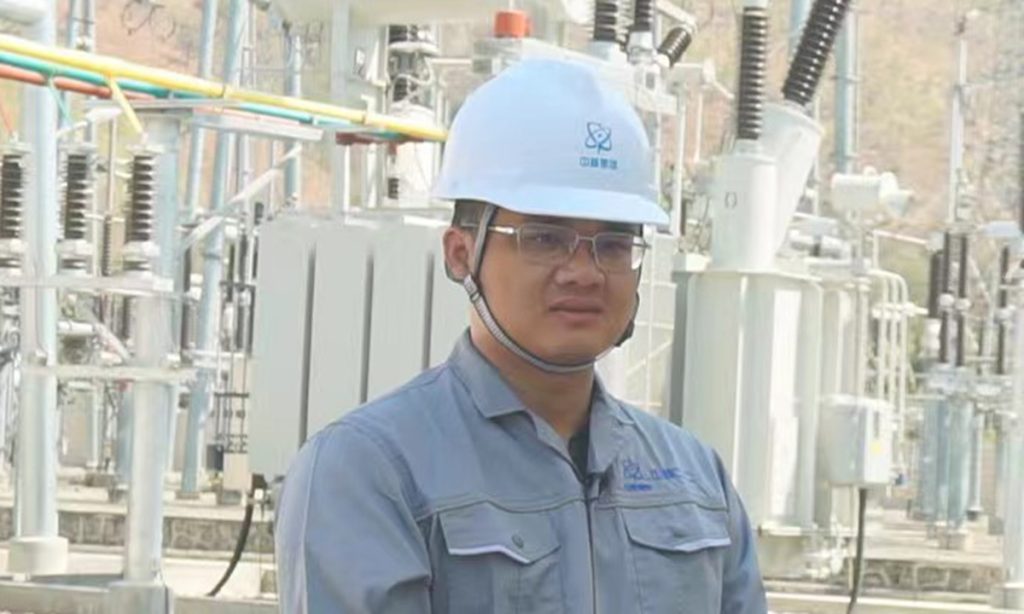Young Chinese nuclear constructors bring electricity to Timor-Leste, help locals improve lives, realize dreams

"The biggest meaning of my job is to improve Timorese people's lives and bring about opportunities for them to chase their dreams," Dai Linfeng, 34, an employee at the National Power Grid Project of the China Nuclear Industry 22ND Construction Co, Ltd (CNI22) in Timor-Leste, told the Global Times.
Dai's job in Timor-Leste is to arrange, guide, and supervise the work of various departments and projects, ensuring safe and qualified construction.
He said that when he first arrived in Timor-Leste in 2022, he began to realize that "the country was economically underdeveloped, with inadequate infrastructure, and local people were living in a low standard of life."
But he was not disappointed as he knew that this is exactly why he and his predecessors came, as well as stayed here for so many years.
"We are here to make changes happen," he said.
Changes did happen. "One day, on my way to the company, I saw many local villagers gathered together watching a live soccer match on TV. It suddenly dawned on me that it was our construction of the national power grid that had enabled this happen," Dai said proudly.
China Nuclear Industry 22ND Construction Co, Ltd (CNI22), which is affiliated to the China National Nuclear Corporation (CNNC), won the contract of the Timor-Leste national power grid project in February 2009. Seven months later, the first batch of CNI22 employees set foot on Timor-Leste's land and started their career of devoting themselves to the construction and development of the country since then.
According to Dai, the main mission of the CNI22 Timor-Leste branch is to build, operate and maintain one national dispatching center, nine substations, 603 kilometers of transmission line, and 1,407 iron towers under the national power grid project of Timor-Leste.
The project is not easy from the very first beginning given the high mountainous forests and wilderness of the island country. It is common for CNI22 engineers and constructors to be get hit by a sudden downpour during site selection. Not to mention the rugged mountain roads and the steep cliffs beside.
Now 65 Chinese employees with an average age of less than 35 are working at the CNI22 Timor-Leste company in charge of the operation and maintenance of the national power grid project.
They told the Global Times that the most difficult task is line inspection as they had to climb towers and cross rivers in the deep mountains.
"Apart from the year-round high temperatures, the terrain on the island is undulating, and it is common for us to encounter snakes, rats, insects, and ants," said Yang Huchen, director of the engineering department.
According to Yang, due to poor transportation in Timor-Leste, many places cannot be reached by trucks, thus their employees can only walk there. The communication signal in the mountains is also weak, making each line inspection feel like an adventure.
Yang clearly remembers one time when he was inspecting an iron tower near the river, the sky was clear and sunny. Just about 10 minutes later, a rainstorm suddenly hit. He and his colleagues immediately ran uphill. Not long after, when they looked back at the path they had just taken, the water, which was only at their ankles before, had risen to over a meter high, and the trees along the way had been knocked down by the flood.
It is not an exaggeration to say that CNI22 workers have brought a light to the people of Timor-Leste with their feet, and they continue to safeguard this light with their feet.
"As long as you are here, we can rest assured!" The dedication and efficient work of CNI22 youngsters have earned themselves thumbs up from local residents time and time again, which in return serves as encouragement to the young team and strengthens their resolve to continue to contribute to the development of Timor-Leste.
Apart from devoting to the construction of infrastructure of Timor-Leste, the CNI22 has also participated deeply in local people's lives after 15 years of integration. It has donated a multimedia classroom equipment to local schools, and has also been helping local people in need of help by sending them supplies like rice and milk, actively participating in public welfare activities.
"Our projects and our presence in Timor-Leste not only help promote cooperation between China and Timor-Leste toward mutual benefit, but also create a large number of opportunities for local people to improve their livelihoods and realize their dreams. This makes me feel that my work is so meaningful," Dai said.
"I would like to participate in more livelihood projects in Timor-Leste in the future, so that more local people can get benefited, I also hope that under the Belt and Road Initiative, China and Timor-Leste will continue to cooperate and bring more chances," Dai said.